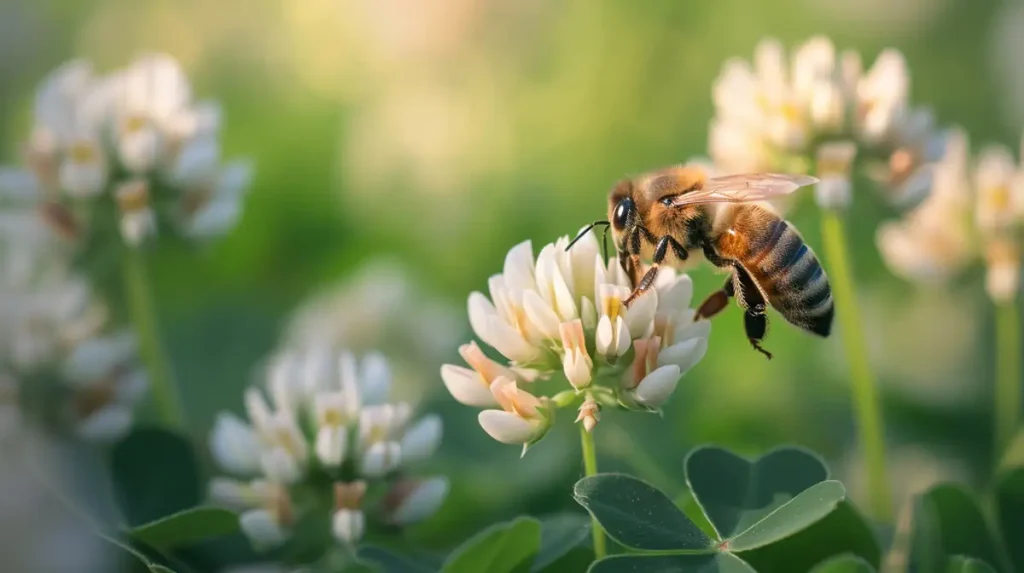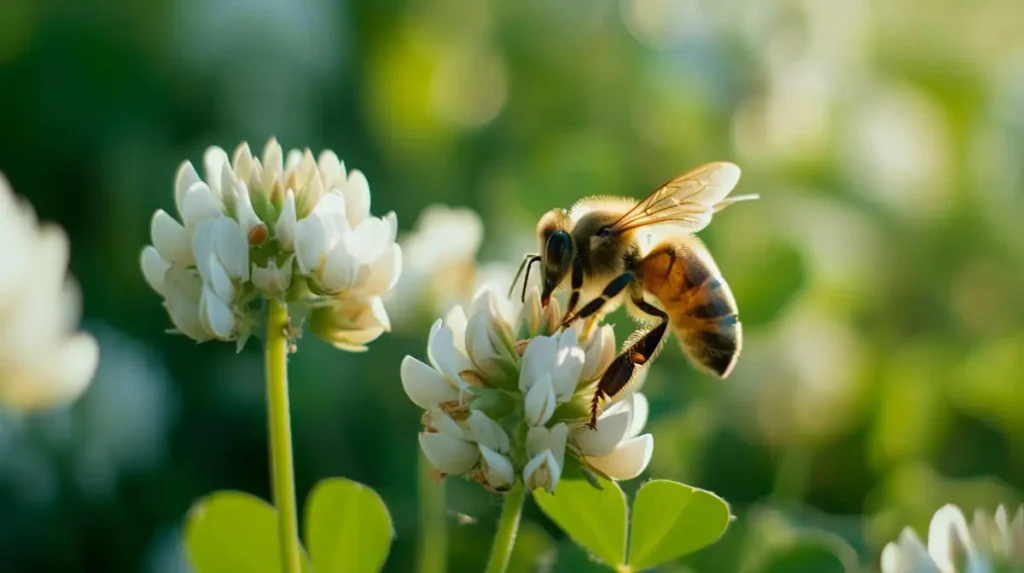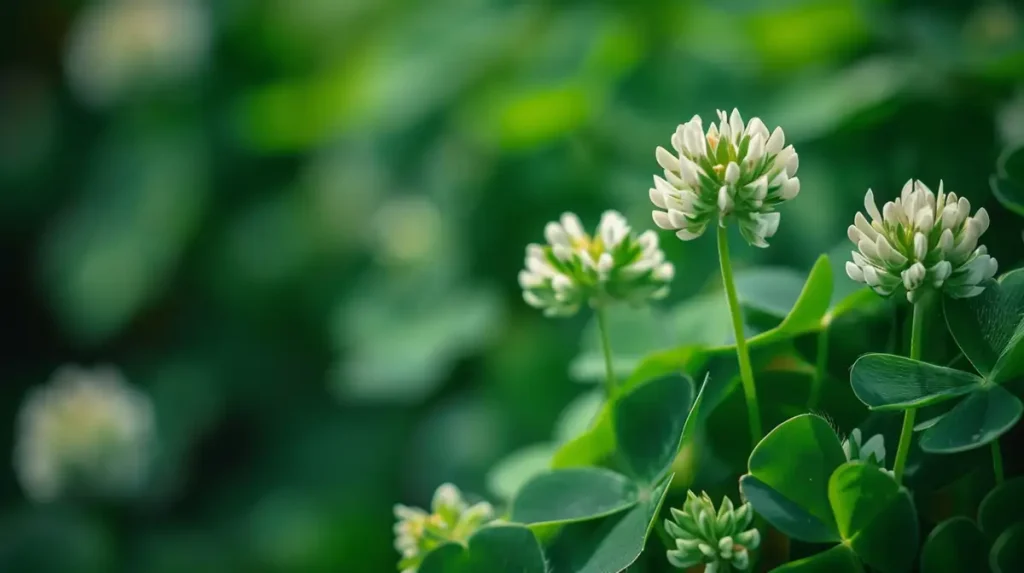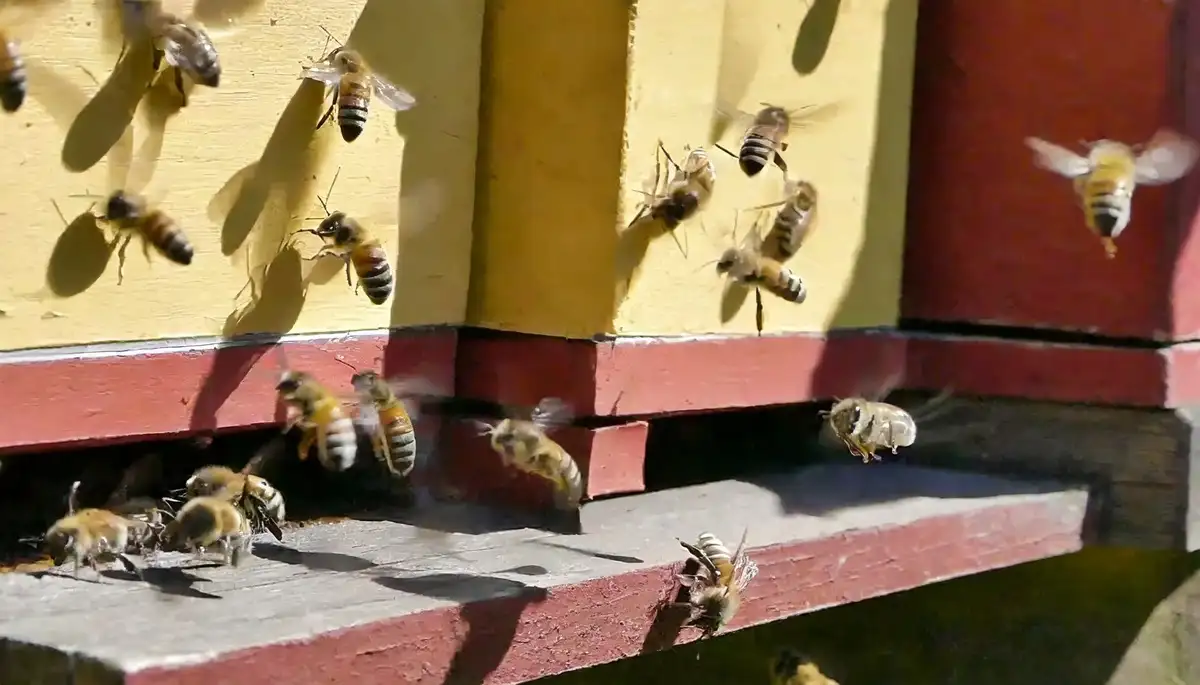Table of Contents
Clover honey, primarily derived from the nectar of clover flowers, stands out in the honey world for its remarkably sweet, mild flavor and light color. Popular among honey enthusiasts, it’s often recognized for its classic honey taste, making it a versatile choice for culinary uses. The specific type of clover—such as white clover or red clover—can influence its flavor and color. Additionally, clover honey holds nutritional benefits, including antioxidants and natural sugars, and is preferred for its potential anti-inflammatory properties. Its widespread availability and gentle flavor profile make it a favorite in many households.
In the below paragraphs, we will take a more detailed look at this topic.
For many people, honey is honey; they are completely unaware that there are distinct types available. Furthermore, most individuals have no idea that commercially, mass-produced honey tastes completely different to honey that is harvested straight from the hive. With that in mind, if you have ever heard of clover honey, you might be wondering what it is and how – or if – it differs from regular honey.
How is Clover Honey Made?
So, what is clover honey? As you might surmise, clover honey is a specific type of honey produced by honeybees that have predominantly gathered nectar from the blossoms of clover plants. To fully understand the distinct qualities of clover honey, it’s essential to explore the honey-making process itself.
Honeybees are organized into a complex society with a division of labor. Worker bees, which are female bees that do not reproduce, are responsible for foraging and gathering nectar and pollen. Nectar is a sweet liquid produced by flowers and is vital for the honey-making process. In the case of clover honey, worker bees visit clover plants, using their specialized tubular mouthparts called proboscises to extract nectar from the flowers. The nectar is then stored in a unique organ within the bees known as the honey stomach.
Once their honey stomachs are full, the worker bees return to the hive and pass the nectar to house bees. House bees, also female worker bees, remain inside the hive to process the nectar and maintain the colony. These bees take the nectar from the foraging bees and chew it, mixing it with enzymes in their mouths. The nectar is then passed from one house bee to another, a process that helps to break down the complex sugars in the nectar and extract some of the water content.
Through this process, the nectar begins to transform into honey. However, the honey still contains too much water to be properly stored. To reduce the water content, the bees spread the honey across the honeycomb cells, creating a thin layer that increases the surface area exposed to air. The bees then fan their wings rapidly to generate airflow within the hive, promoting evaporation and reducing the honey’s water content.
The honey is considered ready for long-term storage when approximately 80% of the water has evaporated. At this point, the honey has a thick, viscous consistency and is transferred to other cells within the honeycomb. To keep the honey fresh and protected, the bees seal these cells with a layer of beeswax, creating an airtight seal. This final product is the sweet, golden clover honey that we know and love.

Is Clover Honey the Same as Regular Honey?
There are many different types of honey, each with their own unique flavor profiles and properties, depending on the floral source. As one of the most well-known and widely available honey varieties, how does clover honey compare to regular honey? Let’s delve deeper into the world of honey and explore the differences between clover honey, raw honey, and regular honey.
Clover Honey: A Popular Honey Variety
Clover honey is derived from the nectar of clover flowers, which are a favorite foraging spot for honeybees. As a plant clover, is widespread and easily accessible for bees, making clover honey one of the most common and abundant types of honey found in grocery stores and supermarkets.
Clover honey has a light, mild flavor and a golden color. It is often considered the standard by which other honey varieties are compared. In addition to its pleasant taste, clover honey has several health benefits, such as containing antioxidants, vitamins, and minerals, all of which contribute to its popularity.
Raw Honey: Unprocessed and Natural
Raw honey, as the name suggests, is honey that is unprocessed and unheated. This type of honey is taken straight from the hive and strained to remove any impurities, like beeswax, before being consumed. Beekeepers typically strain raw honey using a nylon cloth, allowing the honey to pass through while trapping any solid particles.
- Carter, Anthony (Author)
- English (Publication Language)
- 194 Pages - 02/28/2024 (Publication Date) - Independently published (Publisher)
The unprocessed nature of raw honey means that it retains its natural enzymes, vitamins, minerals, and antioxidants. This makes it a healthier option compared to processed honey. Raw honey can be a variety of clover honey, but the key distinction lies in its minimal processing.
Regular Honey: Processed and Commercialized
Regular honey is the type of honey typically found in grocery stores and supermarkets. This honey undergoes various processing steps before it reaches the consumer. These steps often include heating, filtering, and sometimes the addition of other sweeteners or preservatives to improve shelf life and taste.
During the processing of regular honey, it is often boiled and filtered to remove any impurities and create a more uniform appearance. Nevertheless, this process also removes many of the honey’s natural nutrients and beneficial properties. As a result, regular honey loses much of its antioxidant content and is considered less healthy than raw honey.
It is important to note that clover honey can be found in both raw and regular forms. The primary difference between the two lies in the level of processing they undergo rather than the floral source itself.
What is the Healthiest Honey?
A common misconception exists that clover honey is inherently healthy. However, it’s essential to understand that the healthiest honey is the one that comes directly from the hive, without any additives and without having undergone any processing. The type of honey, such as clover honey in this case, does not necessarily determine its health benefits.
Raw Honey: A Nutritional Powerhouse
Raw honey is a natural, unprocessed sweetener that boasts numerous health benefits. It contains various antioxidants, including phenolic acids, glucose oxidase, flavonoids, and ascorbic acid. Antioxidants are vital for our health because they combat free radicals, which can damage cells and increase the risk of certain cancers and heart disease.
In addition to its antioxidant properties, raw honey also has a high nutritional value. It is a source of essential vitamins and minerals, such as B vitamins, vitamin C, calcium, iron, potassium, and zinc. These nutrients contribute to overall well-being and help support various bodily functions, such as energy production, immune system function, and tissue repair.
Antibacterial and Antiviral Properties
Raw honey possesses remarkable antibacterial and antiviral properties, making it an excellent remedy for soothing sore throats and suppressing coughs. It is a common ingredient in many cough syrups and throat lozenges, as it can coat the throat and alleviate irritation. Many people consume raw honey to help alleviate symptoms when they have a cough or cold as it can help to combat the bacteria or viruses responsible for these illnesses.
Anti-Inflammatory and Wound Healing
Another noteworthy benefit of raw honey is its anti-inflammatory properties, which can help reduce inflammation in the body. This makes it a popular choice for individuals with inflammatory conditions, such as arthritis or inflammatory bowel disease. Additionally, raw honey has been used for centuries to promote wound healing thanks to its antibacterial and anti-inflammatory properties. When applied topically, it can create a moist environment that fosters the healing process and prevents infection.
Choosing the Healthiest Honey
To ensure you’re getting the healthiest honey possible, consider the following factors:
- Source: Opt for honey that is locally produced as it can provide additional benefits such as reduced allergy symptoms by exposing the consumer to small amounts of local pollen.
- Raw vs. Processed: Always choose raw, unprocessed honey over processed varieties as the latter often undergo high-temperature treatments that can destroy the natural enzymes and antioxidants present in raw honey.
- Color: The color of honey can vary depending on the flowers from which the bees collect nectar. Generally, darker honey has higher antioxidant content than lighter honey. However, personal taste preferences should also be taken into account when choosing honey.
- Organic: If possible, opt for organic honey as it ensures the bees have not been exposed to harmful chemicals and their honey remains free of pesticides and other contaminants.

Does Clover Honey Have Health Benefits?
Clover honey benefits are many in terms of health (when it is raw and unprocessed). Although it does not possess as many advantages as darker honey varieties like manuka honey, clover honey can still contribute to overall health in a number of ways.
One notable clover honey benefit is its potential to lower blood pressure and reduce bad cholesterol levels. This is important because maintaining healthy blood pressure and cholesterol levels can decrease the risk of heart disease and other cardiovascular complications.
Clover honey is particularly rich in two potent antioxidants – phenolic acid and flavanols – which are known for their anti-inflammatory properties. These antioxidants play a crucial role in promoting overall health and wellbeing.
Flavanols in Clover Honey
Flavanols are a subclass of flavonoids, which are naturally occurring compounds found in plants. They have been found to improve blood flow within the body and ensure efficient transportation of nutrients and oxygen through the blood to various organs and tissues. By promoting vasodilation, or the relaxation of blood vessels, flavanols can help lower blood pressure and reduce the risk of cardiovascular issues.
Phenolic Acid in Clover Honey
Phenolic acid is another important antioxidant present in clover honey. Studies have demonstrated its potential benefits for brain health, as it has been found to be protective against various neurological disorders. When used in conjunction with other treatments, phenolic acid may contribute to the management and prevention of conditions such as epilepsy, depression, Huntington’s disease, and Parkinson’s disease.
In addition to these specific health benefits, the natural sugars found in clover honey can serve as a quick source of energy for the body. Unlike refined sugars, the glucose and fructose in honey are more easily absorbed and metabolized by the body, providing a more sustained energy boost.
It is important to note that while clover honey has its health benefits, these are best realized when the honey is raw and unprocessed. Processed honey often undergoes heat treatment and filtration, which can destroy many of the beneficial enzymes, nutrients, and antioxidants. To maximize the clover honey benefits, look for raw, unfiltered varieties from reputable sources.

What Does Clover Honey Taste Like?
As mentioned above, clover honey can be classified into two main types: regular or commercial clover honey and raw clover honey. Both varieties share some common characteristics but also have subtle differences in taste and texture.
Regular or Commercial Clover Honey
Regular clover honey is characterized by its sweet taste and mild flowery undertones. This type of honey undergoes pasteurization and filtration processes, which often result in a more uniform and clear appearance. The heat treatment during pasteurization also helps to extend the honey’s shelf life and maintain its liquid state for longer periods.
The sweet taste of regular clover honey can be attributed to the natural sugars found in the nectar of clover flowers as well as the potential addition of sweeteners during commercial processing. This type of honey pairs well with a wide variety of foods, such as tea, yogurt, or toast, making it a versatile and delicious addition to your pantry.
Raw Clover Honey
In contrast to its regular counterpart, raw clover honey is less sweet and has a more pronounced floral flavor. This is because raw honey is unprocessed and free from additives like sweeteners. Raw clover honey retains more of the natural characteristics of the honey, which means that the taste can vary depending on factors such as the specific clover species and the region where the honey is harvested. Raw honey enthusiasts often prefer this variety for its natural, unadulterated taste profile and potential health benefits, as it contains higher levels of enzymes, antioxidants, and other nutrients compared to processed honey.
Color and Consistency
Clover honey typically exhibits a light amber color when in a runny, liquid state. However, if the honey crystallizes, it may take on a creamier, whiter appearance. This process, also known as setting, is a natural occurrence in honey and does not affect its quality or taste. The color and consistency of clover honey can vary depending on factors such as the specific type of clover plant, the processing method, and the age of the honey.

Does Clover Honey Go Bad?
Clover honey, like all other types of honey, has an indefinite shelf life. This effectively means it will never expire, provided it is stored correctly. In fact, jars of perfectly preserved honey dating back thousands of years have been found by archaeologists excavating tombs in Egypt.
The high sugar and low water content of honey are that which contribute to its exceptionally long shelf-life. Since it contains very little water while having a very high sugar content, bacteria cannot grow in honey and cause it to spoil. Another contributing factor is the pH content of honey, which is an average of 3.9, making it acidic. Acidic environments prevent the growth of various bacteria including Salmonella, E. coli, C. diphtheriae, and Streptococcus.
In addition to all of this, bees themselves help with the preservation of the golden liquid they produce by secreting an enzyme known as glucose oxidase. This glucose oxidase is responsible for converting sugar into gluconic acid and producing hydrogen peroxide, which in turn inhibits the growth of various microorganisms.
With that being said, it is not impossible for clover honey, like any other variety of honey, to go bad. If honey is left in the open in a humid environment, it will eventually spoil. Likewise, if you allow your honey to be contaminated by water or other substances, it is likely that it will spoil.
It is important therefore that you keep your honey in a sealed jar, preferably a glass jar, and store it in a pantry or cupboard at room temperature. Although storing your honey in a refrigerator will not harm it in any way, it is not recommended to do so as the cooler temperature can lead to accelerated crystallization of the honey.
Why Does Clover Honey Crystallize?
Crystallization of honey is very common. In fact, it can occur more quickly with clover honey because it contains more glucose than fructose. When the glucose begins to separate from the water in the honey, tiny crystals begin to form. Because there is such a low water content in honey, the sugars will not remain in a dissolved state permanently.
Despite what many people believe though, crystallized honey is not bad and is still perfectly edible. Indeed, some people actually like the gritty texture of crystallized honey.
Raw honey tends to crystallize faster than commercial honey because of the extra particles of things such as beeswax, pollen, and other nutrients within it. Nevertheless, it is these other particles that makes raw honey healthier.
If you do not like crystallized honey, you can easily return it to its liquid form by gently heating the jar in a pan or pot of warm water or by placing the honey in the microwave on a low setting, stirring it during the heating process to help dissolve the crystals.

What is Clover Honey – Conclusion
In conclusion, clover honey is a widely available and popular type of honey produced by bees that collect nectar from clover flowers. Its availability in both commercially produced and raw forms provides consumers with options to suit their preferences. Whether consumed for its taste or potential health benefits, clover honey remains a staple in the United States and beyond, and its production continues to be an important aspect of the beekeeping industry.
FAQs
Q: Is clover honey raw or pasteurized? A: Clover honey can be found in both raw and pasteurized forms. Raw honey has not been heated or filtered and may contain pollen and other particles, while pasteurized honey has been heated to kill any bacteria and may be filtered to remove impurities.
Q: Can clover honey be used in cooking and baking? A: Yes, Clover honey can be used in cooking and baking as a natural sweetener. It can also be added to marinades, salad dressings, and other recipes for added flavor.
Q: Where can I buy clover honey? A: Clover honey can be found in most grocery stores, health food stores, and online retailers. Look for organic or raw varieties for the highest quality honey.
Q: How should clover honey be stored? A: Clover honey should be stored in a cool, dry place away from direct sunlight. It does not need to be refrigerated but can crystallize over time, which can be remedied by gently warming the honey in a warm water bath.
Q: Can clover honey help with allergies? A: Some people believe that consuming local honey, including clover honey, can help reduce allergy symptoms by exposing the body to small amounts of local pollen. However, there is no scientific evidence to support this claim.
Q: How is the quality of clover honey determined? A: The quality of Clover Honey is determined by several factors, including its color, flavor, aroma, and moisture content. The United States Department of Agriculture (USDA) has established grading standards for honey, which can be used to determine its quality.
Q: Is clover honey vegan? A: No, honey is not considered vegan as it is a product made by bees. Some vegans choose to consume honey, while others avoid it for ethical reasons.
Q: Can clover honey be used as a natural remedy for skin conditions? A: Yes, Clover Honey has been used as a natural remedy for various skin conditions, including acne, eczema, and psoriasis. Its antibacterial and anti-inflammatory properties may help soothe and heal the skin.
Q: How can I tell if clover honey is fake? A: Adulterated honey, or honey that has been mixed with other substances, is a common issue in the honey industry. To determine if Clover Honey is fake, look for the presence of additives or fillers, as well as a lack of pollen or a uniform texture.
Q: Is clover honey safe for infants? A: Honey should not be given to infants under the age of one, as it may contain botulism spores that can be harmful to their developing digestive system.
Medical Disclaimer: The content provided in this blog post is for informational purposes only and is not intended as medical advice, or to replace the advice of a healthcare professional. Bee stings can cause allergic reactions in some individuals, which can be severe and require immediate medical attention. Similarly, consuming bee products, including honey, pollen, propolis, and royal jelly, can cause adverse reactions in people with specific allergies or intolerances. If you experience any negative reactions or are unsure about your allergies, consult with a healthcare provider promptly. The views expressed in this article are based on current knowledge and do not cover all possible health implications. Always seek the advice of your physician or another qualified health provider with any questions you may have regarding a medical condition or before starting any new treatment.
Last update on 2024-04-30 / Affiliate links / Images from Amazon Product Advertising API






